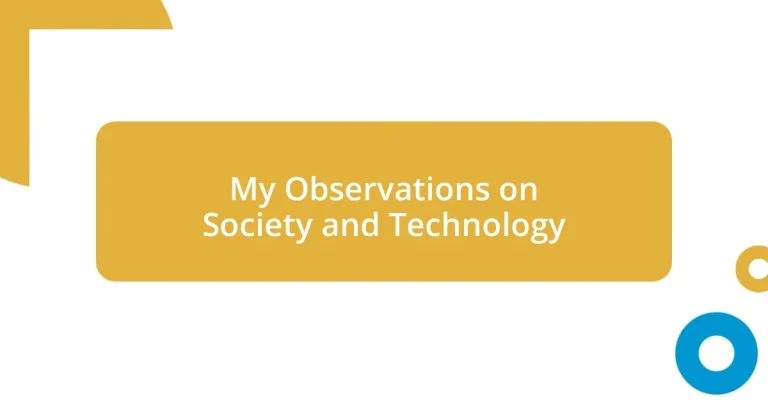Key takeaways:
- Technology enhances global communication but may diminish the depth of personal connections and empathy.
- Social media shapes cultural norms, encouraging rapid trend dissemination but risking authenticity and individual self-esteem.
- Adaptation to technological change necessitates a shift in mindset, highlighting the importance of embracing innovation over resisting it.
- Ethical considerations in technology demand consumer awareness and transparency regarding data privacy and the impact of advancements like AI.
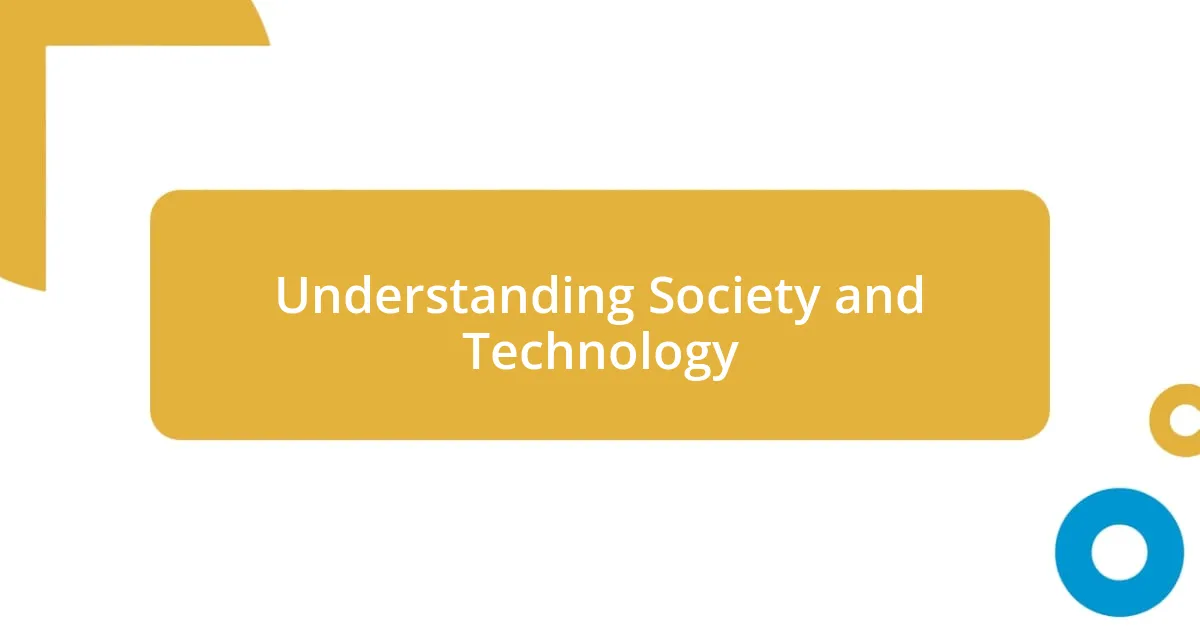
Understanding Society and Technology
As I reflect on the intricate relationship between society and technology, I can’t help but recall a moment from a few years back when I experienced the magic of a virtual reality event. It was astonishing to interact with people from all over the world, yet I felt a tinge of loneliness, wondering if such connections, despite being real-time, could ever replace the warmth of a physical hug. This duality often leaves me pondering: Are we truly connecting, or are we using technology as a mere substitute for genuine human interaction?
The rapid pace of technological advancement has transformed how we communicate, for better or worse. I remember navigating my first online community, the excitement of shared interests uniting folks from various backgrounds. Yet, as the digital world expanded, I noticed an unsettling trend—disagreements often escalated more fiercely behind a screen. I ask myself, do we lose empathy when we communicate through emojis and texts rather than face-to-face?
In my day-to-day life, the influence of technology is unmistakable. I often catch myself scrolling through social media feeds, feeling both informed and overwhelmed by the endless stream of information. This constant connectivity raises questions about our mental health and well-being: Are we enhancing our understanding of society, or are we just amplifying noise? Such reflections compel me to think critically about how we embrace technology in shaping our collective future.
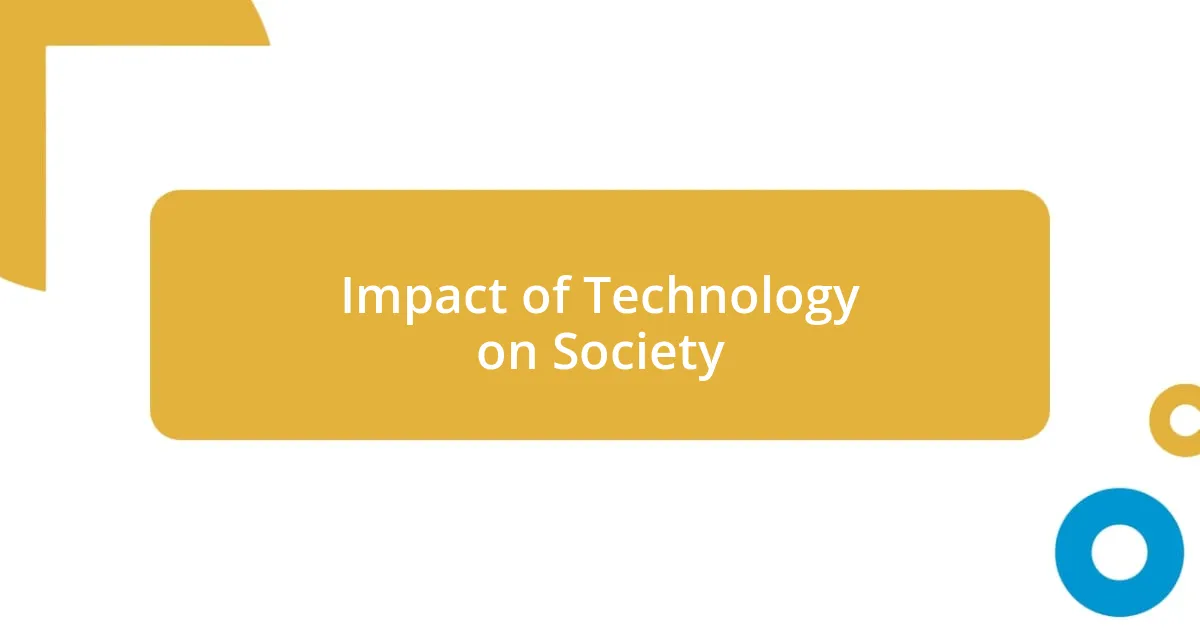
Impact of Technology on Society
The rise of technology has undeniably reshaped our social landscape, turning local conversations into global dialogues. I remember vividly the day I attended my first webinar; I felt inspired not only by the content but also by the diversity of voices participating from various corners of the world. Yet, sometimes I wonder how much of that dialogue is genuine versus performative. Are we truly listening, or merely waiting for our turn to speak?
Another aspect of technology’s impact is its effect on relationships. When I think back to my childhood, exchanging letters with friends brought a thrill of anticipation. Nowadays, I find myself sending quick texts and voice messages, often missing the heart behind more thoughtful communication. Is this convenience making us closer or is it dulling the richness that comes from more traditional interactions?
Society now faces a paradox of choice fueled by technology. On any given day, I can order groceries, schedule doctor’s appointments, and attend virtual meetings, all while in my pajamas. However, this convenience can sometimes feel overwhelming. With so many options at our fingertips, I can’t help but ask: does the abundance of technology simplify our lives, or does it complicate our decision-making processes?
| Aspect | Technology’s Impact |
|---|---|
| Communication | Enables global dialogue but may reduce genuine connections |
| Relationships | Fosters quick exchanges but risks depth and thoughtful interaction |
| Decision-Making | Increases options but can lead to overwhelming choices |
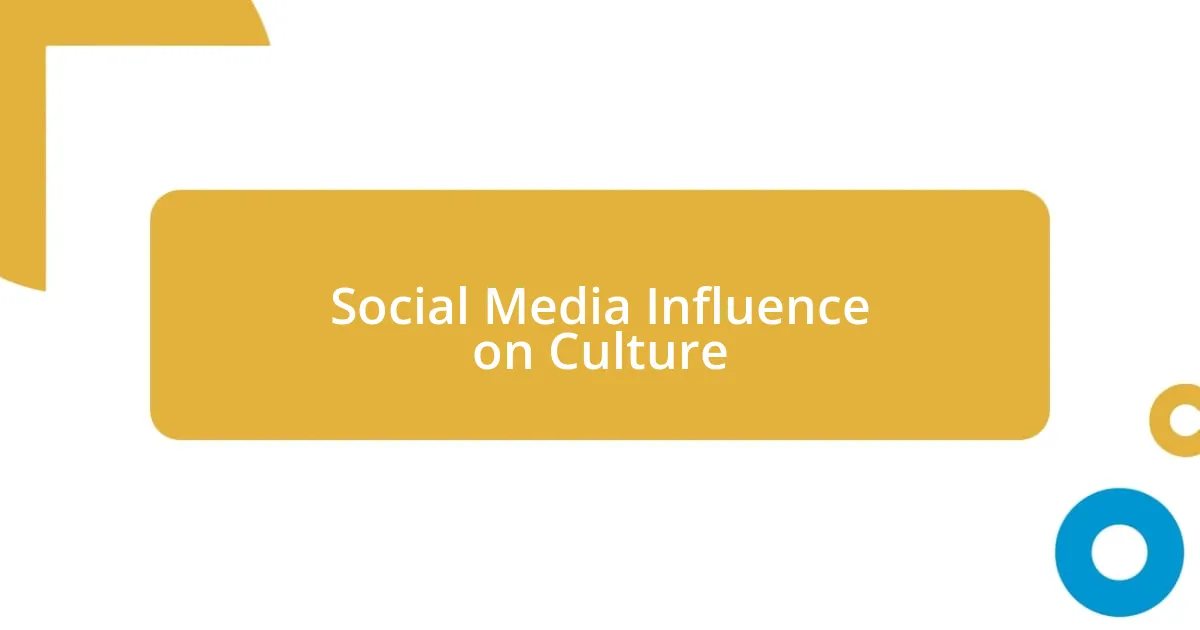
Social Media Influence on Culture
Social media has become a powerful cultural force that shapes our values, trends, and even identities. I vividly recall a time when a viral challenge swept through my social circles, inspiring creativity but also raising eyebrows at the sometimes reckless behavior showcased online. This phenomenon reflects a deeper truth: social media can amplify both positive and negative cultural elements, creating a landscape where what is deemed popular often overshadows what is genuinely meaningful.
- It democratizes content creation, allowing voices from all walks of life to be heard.
- Cultural trends can spread rapidly, forging connections among people worldwide.
- At the same time, there’s a risk of homogenization, where diverse traditions may be diluted under popular trends.
- The pressure to conform to online personas can lead to anxiety and affect self-esteem.
The impact of social media on cultural norms often hits home quite personally. I remember watching friends transform their lifestyles to mirror those seen in influencer posts, seeking validation through likes and shares. It made me think about how much of our authenticity we’re willing to sacrifice for online acceptance. I believe that while social media can foster a sense of community, it also challenges us to stay true to our genuine selves amid external pressures. It forces me to reflect on how I curate my online presence and the values I want to uphold in this digital age.
- Social media encourages instant feedback, which can drive cultural innovation.
- There’s a growing divide where different cultures engage with social media in unique ways.
- The quest for virality can overshadow meaningful discussions, leading to a culture of spectacle.
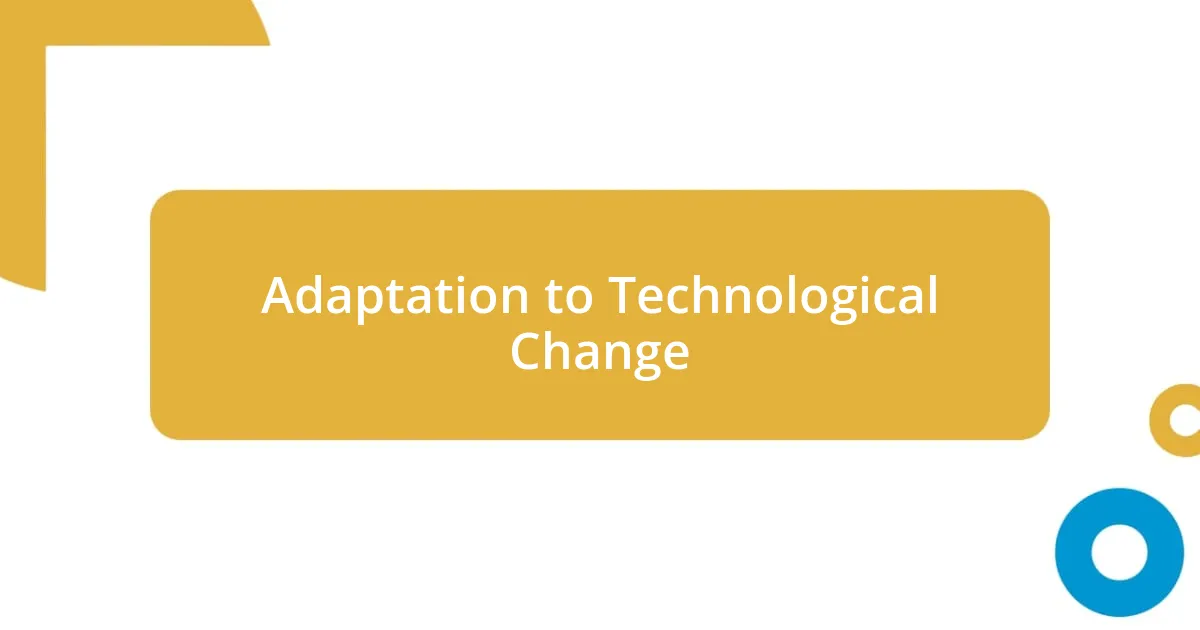
Adaptation to Technological Change
The process of adapting to technological change can often feel like a roller coaster ride. I recall when smartphones first became mainstream; I was amazed at how quickly my friends embraced them. Yet, I still found myself clinging to my old flip phone for a while. It wasn’t just about the device; it was the fear of losing touch with the simpler interactions of life. I wondered, is it worth it to adapt when it means letting go of things we once cherished?
As I’ve navigated through various technological advancements, I’ve noticed that adaptation isn’t merely about adopting new tools but also about reshaping our mindsets. For example, I once resisted online banking, thinking it was impersonal and insecure. Eventually, I realized the convenience it offered — allowing me to manage my finances anytime, anywhere. This shift made me question: how often do we resist change out of fear, only to find that embracing it brings unexpected benefits?
Interestingly, I’ve observed how different generations interact with technology. My younger cousin seems to effortlessly integrate new apps and devices into her life, while I often find myself grappling with each update. It dawned on me that adaptability is largely a skill we can develop. So, I wonder: what if we approached technological changes with curiosity rather than hesitation? By being open and accepting of change, I feel like we can transform our relationship with technology into something meaningful and enriching.
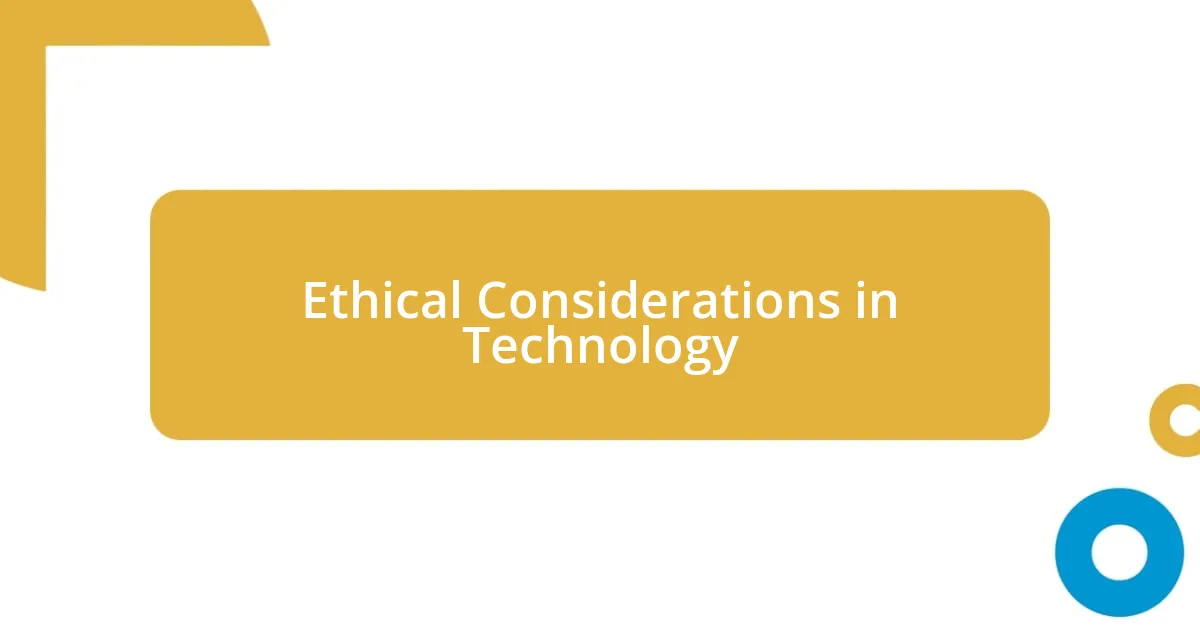
Ethical Considerations in Technology
The ethical implications of technology often swirl around me like a constant whirlwind of questions and challenges. For instance, when I first started using facial recognition software, I felt a sense of awe but also unease. I couldn’t shake the thought: who else is accessing my data and for what purposes? This lingering concern inspires me to question the balance between innovation and privacy, prompting a deeper reflection on how much of our personal lives we willingly surrender in the name of convenience.
Navigating the landscape of artificial intelligence has been equally thought-provoking. I recall a conversation with a colleague about AI’s potential to reshape entire industries. While I was intrigued by the possibilities, I also felt a pit in my stomach thinking about job displacement. As we move forward, I wonder: are we adequately preparing for the human impact of such technological shifts, or are we selling our ethical responsibilities short?
Moreover, the rise of data collection often makes me ponder about consent and transparency. I remember an incident where an app I enjoyed was revealed to be monetizing user data without clear consent. It left me feeling tricked and frustrated. This makes me reflect on the importance of ethical standards in tech development. How often do we choose convenience over informed choice? I believe that as consumers, we must demand transparency and ethical practices from the tech companies we support. It’s essential to ensure that innovation aligns with our values rather than undermines them.
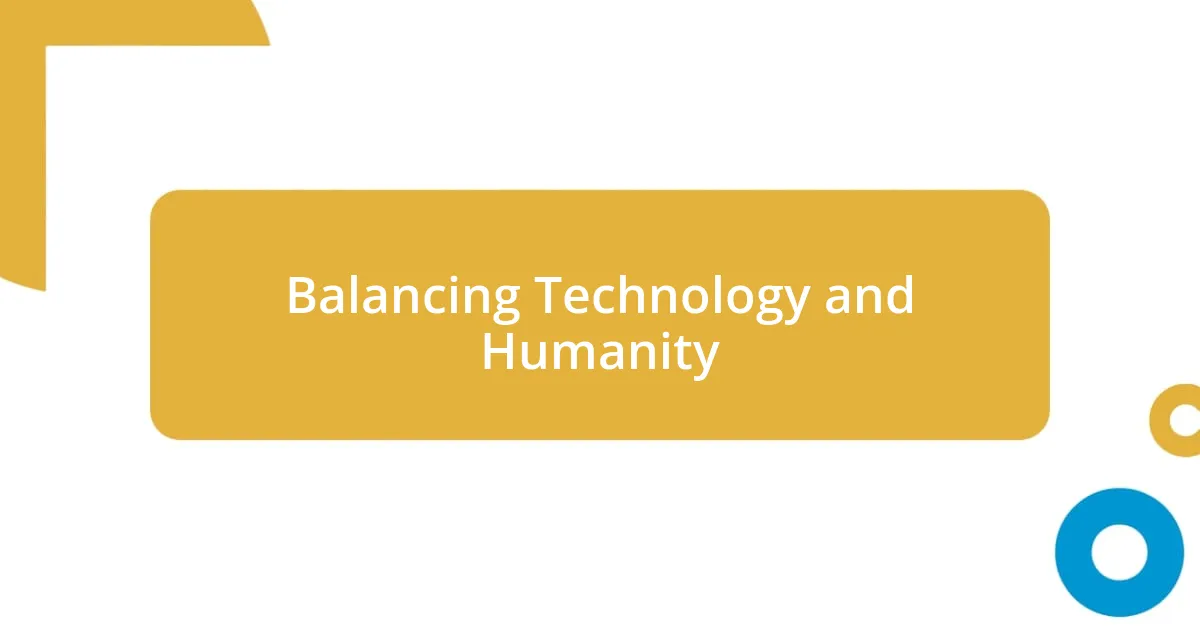
Balancing Technology and Humanity
Finding the right equilibrium between technology and humanity can often feel like walking a tightrope. I vividly remember when I first attended a family gathering, and instead of genuine conversations, everyone was glued to their screens. I couldn’t help but ask myself, where did the warmth of face-to-face interactions go? This moment highlighted for me the importance of setting boundaries with technology, ensuring it enhances our connections rather than replacing them.
In my daily life, I strive to carve out time for tech-free moments. One evening, I decided to leave my phone in another room during dinner. What a revelation! The laughter and storytelling flowed more freely without notifications pulling us away. I realized that these simple adjustments could help restore the richness of our human experiences. It makes me think: how often do we allow our devices to dictate our relationships instead of fostering deeper connections?
As I reflect on the impact of technology, I can’t ignore the role of mindfulness. Engaging in practices like meditation or even just taking a walk without the interference of gadgets has helped me feel more grounded. I often wonder: in a world that thrives on constant connectivity, how can we cultivate spaces for reflection and presence? Creating balance might just be about finding those moments of stillness that remind us we are more than our screens.












